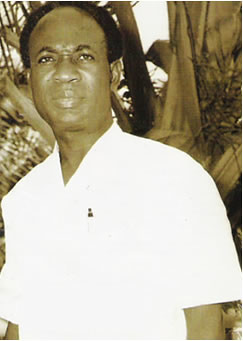
Co-President of Guinea Kwame Nkrumah in Conakry after the 1966 military coup in Ghana. Nkrumah lived in Guinea from 1966-1971., a photo by Pan-African News Wire File Photos on Flickr.
Is the AU equipped to serve Africa’s people for another 50 years?
Thursday, 23 May 2013 00:00
Geoges Nzongola-Ntalaja
THE African Union (AU) is now 50 years old. Amid the celebrations this week, the AU — which was established as the Organisation of African Unity (OAU) in 1963 — needs to take stock of its strengths and weaknesses as an intergovernmental organisation designed to promote the pan-African agenda politically and economically.
As articulated by the leading figures of pan-Africanism, that agenda consists of a three-dimensional project of political self-determination, economic self-reliance, and solidarity in the promotion and defence of African interests nationally and internationally.
The OAU came into existence as a compromise between the radical pan-Africanism of leaders such as Kwame Nkrumah, who advocated a union government and a continental military high command, and the more conservative outlook of the pro-western leaders of Nigeria, Ivory Coast and Liberia, who insisted on a gradual approach to African economic and political integration.
Despite the antagonistic positions separating them, the groups were both favourable to setting up a pan-African institution based on the principles of state sovereignty, non-interference in the internal affairs of member states and the inviolability of national boundaries.
Within the global context of the cold war, the more limited goals of the OAU were (1) the total independence of Africa from colonialism and white settler rule; (2) the peaceful resolution of interstate conflicts through negotiation, mediation and conciliation; and (3) greater solidarity and economic co-operation.
Decolonisation and majority rule, particularly in the colonial-settler states of Algeria, Kenya and South Africa where racism was institutionalised, were a major achievement of the project.
The culminating event was the liberation of South Africa from apartheid in 1994, ending 82 years of struggle led by the African National Congress and 31 years of support by the continent through the OAU.
This unswerving opposition to white minority rule and colonialism is undoubtedly the OAU’s greatest achievement.
It succeeded in mobilising African and world opinion against colonialists in the Portuguese colonies and settler states of Namibia, South Africa and Zimbabwe. The worldwide isolation of the apartheid state of South Africa, including its exclusion from international organisations and sporting events, was spearheaded by the OAU.
And the OAU African Liberation Committee deserves praise for its outstanding work in supporting armed struggle in Guinea-Bissau and southern Africa. Guinea, Tanzania, Zambia, Angola, Mozambique and Zimbabwe also made great sacrifices in supporting total liberation from colonial oppression.
The OAU also had some achievements in conflict resolution, particularly mediating in border disputes, the major area of interstate conflict in Africa.
However, most of the armed conflicts since independence have been internal rather than interstate. As a pan-African organisation, the OAU had an obligation to address such conflicts, inasmuch as they involved gross violations of human rights, including cases of genocide, and had a humanitarian dimension in the large number of refugees and internally displaced people they generated.
Unfortunately, the OAU failed to exercise its right of intervention in cases of state-sponsored terrorism and heinous crimes, including ethnic cleansing and genocide. In 1979, when President Julius Nyerere of Tanzania took the courageous decision to pursue invading Ugandan troops all the way to Kampala and assist Ugandan patriots in overthrowing the regime of Idi Amin Dada, he found very little support among his African peers.
Things changed for the better in the 1990s, particularly with the adoption in 1993 in Cairo of the OAU mechanism for conflict prevention, management and resolution, which gave the organisation a role in internal conflicts.
Since replacing the OAU in 2002, the AU has increased its intervention in domestic affairs.
Both the AU commission and the regional economic communities (RECs) have played a useful role, sending peacekeeping forces to countries in turmoil. The RECs seem to be playing a greater role in resolving internal conflicts than in promoting economic co-operation and integration.
A major problem confronting the AU is resources. With so much dependence on the EU and other external funding, questions arise about African ownership and initiative in some of the theatres of intervention. In addition to governments’ lack of political will, the lack of resources for peace and security, as well as economic co-operation, is partly because countries are also members of multiple regional institutions.
It is not uncommon for a country to belong to three or more regional economic groups. By spreading themselves thin, countries deprive institutions of the skills and money they need.
This raises the question of how strongly committed Africa’s leaders are to economic and political integration.
This is at the heart of the AU’s future. Its neoliberal development programme, Nepad, is less suited to the needs of workers and peasants than the more comprehensive development strategy of the Lagos plan of action, adopted in 1980.
As an organisation that reflects the social character of the states composing it, most of which are under authoritarian rulers who cling to power through force and electoral fraud, the AU is ill-equipped to meet people’s aspirations for democracy and social progress.
— The Guardian
No comments:
Post a Comment